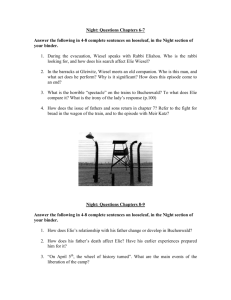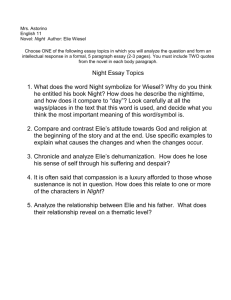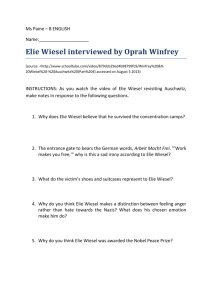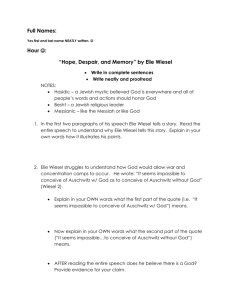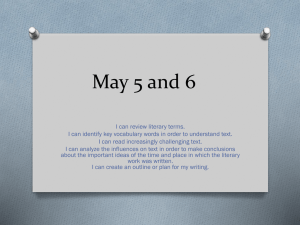Night Study Guide - Ms Paine's Classroom
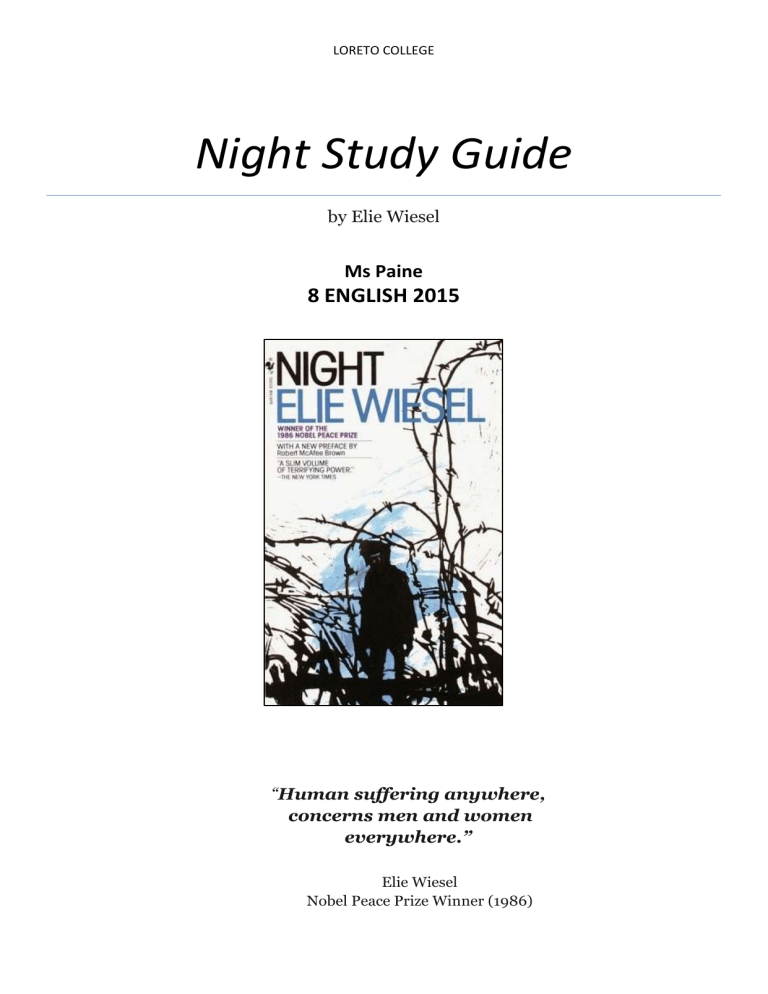
LORETO COLLEGE
Night Study Guide
by Elie Wiesel
Ms Paine
8 ENGLISH 2015
“Human suffering anywhere,
concerns men and women everywhere.”
Elie Wiesel
Nobel Peace Prize Winner (1986)
WHO IS ELIE WIESEL?
“There may be times when we are powerless to prevent injustice, but there must never be a time when we fail to protest.”
Born on September 30, 1928, in Sighet, Transylvania (then and now part of
Romania), Elie Wiesel pursued Jewish religious studies before his family was forced to relocate to Nazi death camps during WWII. Wiesel survived, and later wrote the internationally acclaimed memoir Night . He has also penned many books and become an activist, orator and teacher, speaking out against persecution and injustice across the globe.
(from <http://www.biography.com/people/elie-wiesel-9530714> accessed on 21/09/15)
Wiesel was awarded the Nobel Peace Prize for his activism in 1986.
NIGHT - READING JOURNAL
INSTRUCTIONS: Complete these questions as you read the memoir in your English workbooks.
CHAPTERS 1 AND 2
PERSONAL RESPONSE
1.
What is your reaction to Moché the Beadle? What do you think about his treatment by the villagers after his return from Poland?
Moche the Beadle, attempts to warn the other Jews in Sighet about the Nazis and what they did to the foreign Jews in the village. He is mistreated and not listened to due to being one of the poorest in the village.
ANALYZING LITERATURE
Recall and Interpret
2.
Describe Wiesel’s community at the beginning of the story. How does young Elie view the world and his place in it?
Wiesel’s village is very traditional and isolated. He loves his family and community, but does to wish to no more about his faith and his wider world.
3.
What are some incidents that suggest or foreshadow the coming danger to the Sighet Jews? Why doesn’t the community believe it is in danger?
Moche the Beadle returns to the village after surviving a massacre and attempts to warn people.
Newspaper and radio reports are ignored.
Hungarian policeman who knocks on the sealed window in the ghetto at night, trying to warn them.
German officers visiting the Ghetto
Pg. 11 Elie’s father saying that wearing a star as a Jew wasn’t so bad – (“Poor father! Of what then did you die?)
Jewish people forced to live in a ghetto and a synagogue destroyed.
The family maid offers them a place to hide them in a village.
Elie’s father refuses to sell up and immigrate to Palestine.
4.
What are the conditions on the Jews’ train journey? How do the Jews react to Madame Schäcter’s behaviour? What does this reveal about human nature?
1
Claustrophobic – no space to sit or lie down.
80 per train car
The other people in the train become increasingly annoyed with Madame Schacter’s disturbed behaviour, and at one point hit her to make her be quiet.
People are only interested in surviving due to the extreme conditions in the train car.
Evaluate and Connect
5.
What connection might there be between Madame Schäcter’s treatment on the train and possible future events in the concentration camp? What are some other ways that Wiesel foreshadows, or hints at, the horrors ahead?
Initially the Jewish people on the train treat Madame Schacter as though she is mad when she warns them about the “fire” that she sees. However, later on Wiesel realises that the might have been like a prophet sent to warn them about the Concentration Camps and the crematorium.
FORESHADOWING – is the technique when a writer hints at what is to come in a book, so as to increase tension and suspense.
Moshe the Beadle warning about what the Nazis doing to the Jews
The Hungarian Police Officer attempting to warn Wiesel’s family.
6.
Even though it was 1944, and Nazi extermination of Jews had begun years earlier, the Sighet Jews had very few facts about it. Do you think it is possible in today’s world for a community to know so little, to be so unprepared? Explain.
In contemporary society, amongst people who live in extremely wealthy countries, it is highly unlikely that we would not be aware of events like the Nazi extermination of the Jews. This is because we have access to more sources of knowledge about events such as the internet, tv, newspapers and the radio.
Furthermore, there are more people with phones and cameras able to document such awful events.
CHAPTERS 3 TO 5
PERSONAL RESPONSE
1.
When he arrives at Auschwitz and then at Buna, Wiesel describes scenes he will never forget. What scenes, ideas, or feelings from the memoir do you find unforgettable?
“Men to the left! Women to the right!” pg. 29
Last time Wiesel saw his mother and younger sister alive, and also the last time he saw his elder sisters until after the war.
The murder of elderly people and children
“I pinched myself. Was I still alive?” pg. 32 The events Wiesel witnesses are so horrifying that he has to constantly remind himself that he is still alive and not in a nightmare.
“Never shall I forget…” repeated seven times, reinforces to the reader how much this affects Wiesel.
ANALYZING LITERATURE
Recall and Interpret
2.
Describe the conditions first at the Birkenau reception center, then at Auschwitz, and later at Buna.
How does Wiesel’s relationship with his father change during this time?
Wiesel and his father are mistreated at Auschwitz as they are forced to run naked, sleep 2-3 to a bunk and are given very little in food, water, clothing while doing hard labour.
Elie and his father become much closer in Auschwitz as they struggle to survive.
3.
What events lead to the two hangings Wiesel describes? How does Wiesel feel about his evening meal after each hanging? What do his reactions suggest about how he is changing?
2
4.
What are some ways that Wiesel and the other Jews at the camps try to observe their religion? How have Wiesel’s feelings about God changed since his captivity began?
Evaluate and Connect
5.
In the camps, Wiesel must struggle to stay alive and to remain human. In your opinion, how well does he succeed with his struggles?
6.
There are several discussions about resistance by the prisoners. Why do you think there was no large scale effort to resist?
ACTIVITY: WIESEL AND OPRAH VISIT AUSCHWITZ - DOCUMENTARY
(source: <http://www.schooltube.com/video/879dcb29ed4b98799fc9/Winfrey%20&%20Wiesel
%20%20Auschwitz%20 (Part%204) accessed on August 5 2013)
INSTRUCTIONS: As you watch the video of Elie Wiesel revisiting Auschwitz, make notes in your workbooks in response to the following questions.
1.
Why does Elie Wiesel believe that he survived the concentration camps?
E lie Wiesel partly survived because he was aware that if he died so would his father.
Lucky
2.
The entrance gate to bears the German words, Arbeit Macht Frei (“Work makes you free”). Why is this a sad *irony according to Elie Wiesel?
The phrase on the Auschwitz gate, “Work makes you free” is sadly ironic as the only way the Jews will gain freedom is by working themselves to death.
3.
What do the victim’s shoes and suitcases represent to Elie Wiesel?
To Elie Wiesel, the piles of victims’ shoes and suitcases represents the many lives lost and their lost potential too.
4.
Why do you think Elie Wiesel makes a distinction between feeling anger, rather than hate towards the Nazis? What does his chosen emotion make him do?
Elie Wiesel makes the distinction between anger and hate of the Nazis, because he sees hate as allconsuming and pointless whereas there is potential for healing and motivation from anger.
5.
Why do you think Elie Wiesel was awarded the Nobel Peace Prize?
He was awarded the Nobel Peace Prize because of his determination to ensure that another Holocaust would ever happen again.
CHAPTERS 6 TO 9
PERSONAL RESPONSE
1.
What feelings and thoughts went through your mind as you read about Wiesel’s final experiences as a German prisoner? What would you say if you could talk to him about this time in his life? What would you want him to explain to you?
Feelings and thoughts – shocked about the events that Wiesel experienced. Anxious for Wiesel as he struggled to survive.
QUESTION: How did you manage your anger towards the Nazis? (In the Oprah interview, Wiesel explained how anger can be a motivation but that hate is damaging.)
3
ANALYZING LITERATURE
Recall and Interpret
2.
Why do Wiesel and his father leave Buna? How do they respond to the circumstances of the forced march?
Wiesel and his father leave Buna as they fear that if they stay in the sick bay, the Germans will execute them as the Russians are approaching.
Despite the horrific, freezing march, Elie continually tries to motivate his father such as stopping him from falling asleep in the snow.
3.
What happens between Rabbi Eliahou and his son? What does Wiesel’s reaction to this incident reveal about his relationship with God?
During the march, Rabbi Eliahou is unable to keep up with his son and is deliberately left behind by him. Elie asks his God in prayer to ensure that he would never ever abandon his father like Rabbi
Eliahou’s son.
4.
How does Wiesel treat his father during the journey to Buchenwald and later during Chlomo’s illness’?
Wiesel constantly tries to care and look after his father. He brings him food and water as he is dying, despite what other inmates tell him to do.
Evaluate and Connect
5.
Given their life or death situation, do you believe Wiesel’s attitude toward his father was understandable? Explain your reactions.
6.
Wiesel believes that remembering the Holocaust will help to ensure that this type of atrocity does not occur in the future. Do you think learning about historical events can guide people to behave differently? Explain.
SUMMARY ACTIVITIES
Instructions: Unless otherwise specified, write at least one paragraph per question of at least four to five sentences and include quotations where possible.
1.
Do you feel sorry for Elie and the Jewish people, or do you think that they should have actively resisted their Nazi captors more?
Yes – we do feel sorry for Elie and the Jewish people. It would have been extremely difficult for the prisoners to rebel against the Nazis due to the guards having more weapons and the prisoners being physically weaker than their captors.
2.
In the concentration camps, the Jewish prisoners were treated more like animals than humans. Find three examples from the text that illustrate this.
Living quarters – 2-3 per bunk, minimal food.
Jewish people were transported in cattle cars designed for livestock.
“Faster you filthy dogs” pg. 85
“They pointed at us the way you might choose cattle or merchandise” pg. 99
“I became A-7713” pg. 81
By demeaning Jewish people and treating them like animals they lose their identities as humans, and it becomes easier for the Nazis to mistreat them.
3.
Are there any passages (short quotations of two to three sentences) that you found particularly striking? Why? Find two from Night and explain what is significant about these passages.
Pg. 82 “After the war, I learnt the fate of those who remained at the Infirmary…” – sad irony
Pg. 34 “Never shall I forget…”
“I became A-7713” pg. 81
4
“Fire” Madame Schacter is beaten by other
“From the depths of a mirror, a corpse stared back at me…” pg.
4.
Do you think that Elie was lucky to be freed so soon after of his father's death? What did his father mean to Elie? What could have happened to Elie if he had not been freed within a couple of months?
Explain your answer.
Elie was lucky to be freed so soon after his father’s death as otherwise he might have died as he had given up. His father had given him a reason to survive and when he lost him he struggled.
5.
Elie Wiesel wrote his memoir, Night, so that he could "bear witness" about the Holocaust, and ensure that the suffering of prisoners in the Concentration Camps would never be forgotten. Do you think he has achieved this in his book? Give reasons for your answers.
6.
Elie Wiesel won a Nobel Peace Prize in 1986 for his work in ensuring the Holocaust is never forgotten.
Write a letter to Elie in which you express your support for his work and memoir, Night. The letter should be at least three paragraphs long and set-out properly in your workbooks.
7.
Describe the three most significant characters in Night - Elie, Chlomo and Moche the Beadle. What do you learn about their characters during the course of the novel?
8.
Find two minor characters from the novel and explain their significance. (Eg. Madame Schlacter,
Rabbie Eliahou and his son etc.)
9.
Elie Wiesel is a real person and Night is his memoir of about his experiences during the Holocaust.
Do you think it makes a different to read a true story rather than a fictional account? Give reasons for your answer.
5
WRITING TECHNIQUES IN NIGHT BY ELI WIESEL
INSTRUCTIONS: For the next section looking at the writing techniques, Wiesel using in Night, you can either make the notes on the handout or in your books.
TECHNIQUE 1 - FORESHADOWING
What is foreshadowing?
When you want to let people know about an event that is yet to occur, you can use foreshadowing.
Foreshadowing is used as a literary technique by authors to tease readers about plot turns that will occur later in the story. It often has the effect of increasing a reader’s feelings of suspense.
<https://www.vocabulary.com/dictionary/foreshadowing> accessed on 06/09/2013
In the first three chapters of Night, Elie Wiesel foreshadows the horrors ahead for the Jews of Sighet, by giving the reader a range of clues.
1.
Find two examples of foreshadowing in Chapters 1 to 3. For each example, write down the page number, a short quotation and explain why it is an example of foreshadowing.
Example 1: (describe the context for your quotation, as in what is happening in the plot at this time)
Elie and his family are made to wear a yellow star by the Nazis to identify them as Jewish. His father states that wearing the star isn’t too bad and isn’t “lethal”, even though later on the Nazis send all the
Jews to the Concentration Camps. a) Page Number:
pg. 11 b) Short Quotation (1-2 sentences)
“The yellow star? So what? Its not lethal…” (Poor Father! Of what then did you die?) c) Why is this an example of foreshadowing?
This is an example of foreshadowing, as Elie Wiesel is revealing early on in Night that his father died in a Nazi concentration camp. Despite telling the reader this information early on, it creates suspense and sadness as we know what will happen to his father. It also increases our tension as a reader, because we see how many opportunities the family had to escape but didn’t.
Example 2:
When the foreign Jews in Sighet are deported and later massacred, only Moche the Beadle survies and returns to the village to warn others of what he witnessed. a) Page Number:
pg. 6-7 b) Short Quotation (1-2 sentences)
“I wanted to return to Sighet to describe to you my death so that you may ready yourselves while there is still time.” (pg. 7) c) Why is this an example of foreshadowing?
6
The warnings by Moche the Beadle are a form of foreshadowing as most of the village Jews end up dying in Concentration camps, despite Moche’s attempts to forewarn them about the Nazis’ intentions.
2.
Why do you think an author like Elie Wiesel would choose to use a technique like foreshadowing in
Night? How does he want you as a reader to feel?
Elie Wiesel uses foreshadowing to create feelings of suspense, sadness and frustration in the reader as he forewarns them of his family’s fate and furthermore highlights how many opportunities they had to escape.
TECHNIQUES 2 AND 3: IMAGERY AND SENTENCE STRUCTURE
What is Imagery?
Writers use imagery to help readers form mental images of things or events. This imagery can be literal, as in the writer describing exactly what is in in front of them such as, “The dinner table was rectangular and made of polished brown pine” , but it can also be figurative. This is when a writer compares something to another thing for emphasis like in a metaphor or simile, as in “The clouds hung limply like a set of dark, dirty curtains in the sky”.
Using Sentence Structure for Effect
Sometimes creative writers will deliberately shorten or lengthen a sentence to influence the reader. When sentences are shortened they often serve to emphasise a particular word or phrase to the reader. For instance, in the quotation, “Forgotten, she thought. Rejected.” (Secrets in the Fire, pg. 84), the author,
Henning Mankell, emphasizes the word “Rejected” by making it a one word sentence.
From page 17 of Night:
Open rooms everywhere. Gaping doors and windows looked out into the void.
It all belonged to everyone since it no longer belonged to anyone. It was there for the taking. An open tomb.
3.
What is Elie Wiesel describing at this point in the story? Where have all the Jewish people gone?
Why did they leave their belongings behind?
Elie is describing in this excerpt the empty ghettos where the Jews once lived, after they are taken to the concentration camps by the Nazis.
4.
Why does he describe it as being like “ An open tomb” ? Why is this apt considering what is going to happen later in Night to the Jewish people?
Wiesel describes the ghetto as being an “open tomb”. This is because the residents have left all their worldly goods behind and are forced to go the concentration camps. Elie believes that other people will come and ransack their possessions now that that the Jews
5.
What type of imagery is the phrase “An open tomb” – a simile or metaphor? Do you think this is a good way to describe the abandoned ghetto? Why or why not?
7
“An open tomb” is a metaphor, because it doesn’t use the words “like” or “as” to create a sense of comparison. The “open tomb” metaphor is a good way to describe the abandoned ghetto, as it hints that the Jewish people are fated to die, when they are taken away by the Nazis.
6.
How many words is in the sentence “ An open tomb”? Why make a sentence so short? What effect does it have on you as the reader?
Wiesel uses the three word sentence “An open tomb” for emphasis, as by making it so short it forces the reader to focus on the likely tragedy facing the Jewish people.
Here is another example of imagery from the text. from page 49 of Night:
…On the fourth day, as we stood in front of our tent, the Kapos appeared.
Each one began to choose the men he liked:
“You…you…you” They pointed their fingers, the way one might choose cattle, or merchandise.
7.
What is the image in this excerpt from the text? Is it a simile or a metaphor?
Wiesel uses a simile to describe the Jewish people being chosen like “cattle, or merchandise”.
Here is another example of imagery from the text. from page 49 of Night:
…On the fourth day, as we stood in front of our tent, the Kapos appeared.
Each one began to choose the men he liked:
“You…you…you” They pointed their fingers, the way one might choose cattle, or merchandise.
8.
What is the image in this excerpt from the text? Is it a simile or a metaphor?
________________________________________________________________________________________________________________________________
________________________________________________________________________________________________________________________________
________________________________________________________________________________________________________________________________
9.
What does the choice of imagery say about the way the Nazis and their supporters treated the Jewish prisoners in the concentration camps?
________________________________________________________________________________________________________________________________
________________________________________________________________________________________________________________________________
________________________________________________________________________________________________________________________________
10.
Now can you find two more examples of imagery from Night. Make sure to write down the quotation and page number, as well as explain whether it is a metaphor or a simile.
8
Example 1:
Elie’s description at the end of the book of how he looked after the Concentration Camps. a) Page Number:
Pg. 115 b) Short Quotation (1-2 sentences)
“From the depths of the mirror, a corpse was contemplating me.” c) What type of imagery is this – a simile or metaphor? Why do you think Elie
Wiesel choose this particular image? How does it affect you as a reader?
Wiesel uses a metaphor in describe himself as looking like “a corpse” in the mirror after surviving the Concentration Camps. This choice of image highlights to reader just how traumatic and close dying Wiesel was when the camps were eventually liberated.
Example 2:
Occurs when Wiesel and the others just arrive at the Concentration camps. a) Page Number:
________________________________________________________________________________________________________________________________ b) Short Quotation (1-2 sentences)
“We were dried up trees in the heart of the desert”. a) What type of imagery is this – a simile or metaphor? Why do you think Elie Wiesel choose this particular image? How does it affect you as a reader?
Metaphor – Wiesel likened himself and the other new arrivals to “dried up trees” in the heart of the desert because they were ignored and in a place that lacked hope.
TECHNIQUE 3: REPETITION AND SYMBOLISM
What is Repetition?
Repetition is when a writer deliberately repeats a word or a phrase to emphasize it.
What is Symbolism?
Symbolism is a form of imagery. It is used to represent an idea or quality. For instance, the Australian flag is a symbol of what it means to be Australian and patriotic. Writers use symbols for a similar purpose. In the Harry Potter series by J.K.Rowling, the Gryffidor house shield features a lion:
The figure of a lion traditionally symbolizes bravery and courage which are qualities that J.K Rowling wishes to associate with the characters of Harry, Ron and Hermione.
9
11.
Brainstorm a short list of words that are associated with the word “night” eg. darkness, the moon etc
Shocking
Trauma
Unknown
Fear
Thrilling
Suspenseful
12.
Do these words mostly have negative or positive connotations? (“Connotation” is what happens
when a deliberately chosen word implies or suggests a particular quality.)
Mostly they have negative connotations.
13.
Now, that you have finished reading Night, why do you think Elie Wiesel choose this word as his title of his memoir? What does it symbolize about his experiences in the Concentration Camps?
Wiesel chooses to call his memoir, Night, as the word symbolises how his life in the camps was one long dark nightmare.
Repetition
From pg. 34 of Night
Never shall I forget that night, the first night in camp, that turned my life into one long night seven times sealed.
Never shall I forget that smoke.
Never shall I forget the small faces of the children whose bodies I saw transformed into smoke under a silent sky.
Never shall I forget those flames that consumed my faith forever.
Never shall I forget the nocturnal silence that deprived me for all eternity of the desire to live.
Never shall I forget those moments that murdered my God and my soul turned my dreams to ashes.
Never shall I forget those things, even were I condemned to live as long as God
Himself.
Never.
14.
What phrase does Elie Wiesel constantly repeat in the above passage? What effect does the repetition have on you as a reader?
By repeating the phrase “Never shall I forget” Wiesel is emphasizing to his reader just how traumatic and life-defining his experience in the Concentration Camps has been. The experience has been so horrifying that he will never ever forget it and it will determine the rest of his life.
15.
Wiesel also repeats the word “night” in the first sentence. Why does he believe that his life turned into “one long night seven times sealed.” What does “night” symbolise to him?
Wiesel believes that his life has turned into “one long night seven times sealed” because he will never be able to forget the camps and their horrors. The word “night” symbolises the darkness and fear that the camps cause in Wiesel.
10
16.
Why is the last sentence only one word long? Why choose to emphasize this word to the readers?
What does it say about Elie Wiesel’s experiences at Auschwitz?
Wiesel chooses to emphasize the word, “Never”, because he will never forget Auschwitz and secondly since he survived it his responsibility to ensure it never happens again.
11
